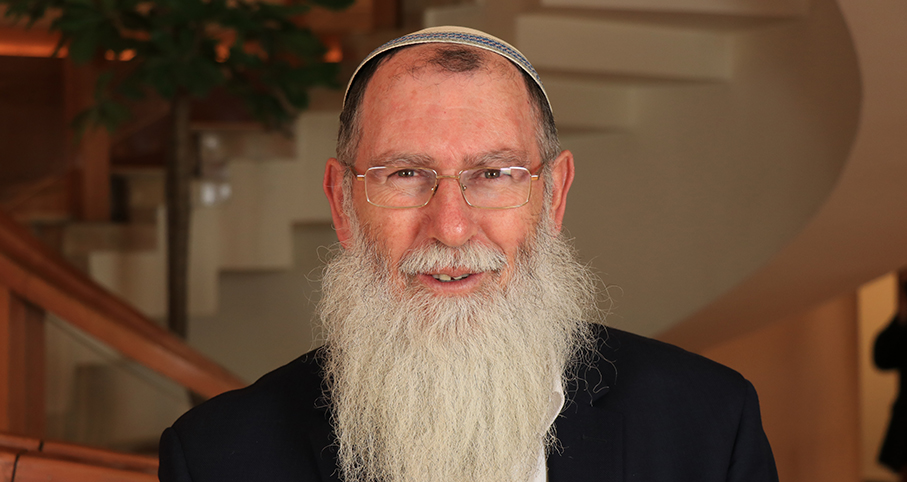Beit Midrash
- Sections
- Peninei Halakha
- Shabbat and Holidays
- Sefirat Haomer
- The Laws of Sefirat Ha'omer
Starting from the night of the omer harvest, there is a mitzva to count 49 days, which are seven weeks. This is known as sefirat ha-omer, counting the omer. The omer harvest took place on the sixteenth of Nisan, the night after the first day of Pesaĥ. That night, they would go out to the fields and harvest barley, bring them to the Temple courtyard, thresh them, winnow them, separate out the chaff, roast the grains, grind them well, produce a tenth of an eifa of flour, sift it through thirteen sieves, mix it with a log of oil, and place a kometz (handful) of frankincense on it. The next day, part of the mixture would be offered on the altar. First, a kohen would wave it; then he would separate a kometz from the mixture and burn it on the altar. After the kometz was burned up, everyone was permitted to eat from the newly harvested grain.
Unlike other festivals, Shavu’ot does not have a calendar date. Whereas Pesaĥ begins on the fifteenth of Nisan and Sukkot on the fifteenth of Tishrei, Shavu’ot’s date is determined by the omer count: the festival begins after the seven-week count is completed, which is why it is called Ĥag Ha-shavu’ot – the Festival of Weeks. This is the meaning of the verse: “You shall count off seven weeks; start to count seven weeks from when the sickle is first put to the standing grain, and then you shall observe the Festival of Weeks for the Lord your God” (Devarim 16:9-10). It also says:
And from the day on which you bring the sheaf (omer) of elevation offering – the day after the “Shabbat” – you shall count off seven weeks. They must be complete: You must count until the day after the seventh week – fifty days; then you shall bring an offering of new grain to the Lord. (Vayikra 23:15-16)
This mitzva is not incumbent upon the beit din alone; rather, every Jew is commanded to count 49 days. The mitzva is to verbalize the count. There is a general principle that applies to mitzvot that require speech-acts: “Shome’a ke-oneh” (“One who hears is as one who responds”). Thus, for example, one can fulfill the mitzva of remembering Amalek by hearing a public reading of Parashat Zakhor, and one can fulfill his obligation to recite a berakha over the counting of the omer by hearing the berakha of the ĥazan. With regard to the actual counting, however, several poskim maintain that each person must verbalize the count, as it says, “u-sefartem lakhem” – literally, “count for yourselves” (Levush, Ĥok Yaakov). Although others maintain that the status of sefirat ha-omer is identical to that of other mitzvot that require speech-acts, and consequently that one may discharge his obligation by hearing someone else count (Pri Ĥadash, Birkei Yosef), nevertheless, le-khatĥila, to satisfy all opinions, each person must verbalize the count (see mb 489:5 and bhl s.v. “u-mitzva”).
This mitzva is rooted in the very beginning of our emergence as a nation. The Sages explain that Israel had sunk to the depths of the forty-ninth level of impurity during their bondage in Egypt and were therefore unworthy of receiving the Torah. God waited seven weeks for them to purge themselves of the defilement of Egypt and enter a pure state, in which they could receive the Torah (based on Zohar, Emor 97). Counting the omer also expresses our anticipation for the giving of the Torah. A midrash relates that when Moshe announced to Israel that after leaving Egypt they would worship God at Mount Sinai and receive the Torah, they asked him, “When will this take place?” Moshe answered, “After fifty days.” Then, due to their great love for God, they counted every day, saying, “One day has passed,” “two days have passed,” and so on, every day. Because of their love and anticipation for the Torah, it seemed like a long time to them (Shibolei Ha-leket §236).
Sefirat ha-omer expresses our longing and anticipation of that great day when God gave us the Torah. By doing so, we undergo a process of purification with respect to all 49 levels of which man is constituted. The purer and cleaner one becomes, the more he will be able to absorb the Torah’s light. Thus, every year, we count the omer in preparation for receiving the Torah (see the end of section 3 below).























